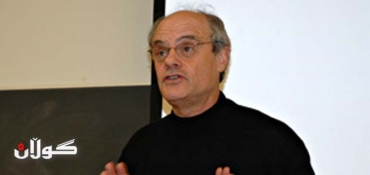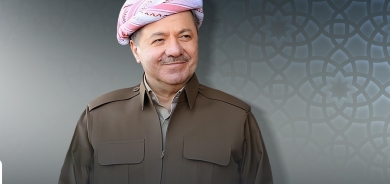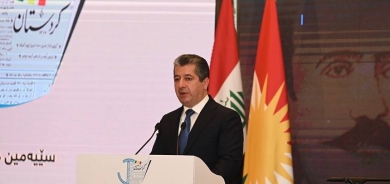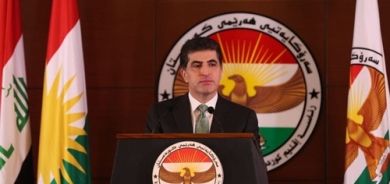Kenneth W. Stein to Gulan: Those who believe that only the Americans can bring down Assad are naïve
April 11, 2013
Exclusive Interviews

Emory University Professor Kenneth W. Stein, Professor of Contemporary Middle Eastern History and Political Science, 1977- present. Author of books and articles on the contemporary Middle East, American Foreign Policy toward the region, and the origins and development of the Arab-Israeli Conflict. He earned his advanced graduate degrees from The University of Michigan. On March 28, 2013, he wrote these answers to the questions posed by Ferhad M. Hassan, Gulan, Editor in Chief.Gulan: After O'bama paid a visit to Middle East, some changes have taken place to the Syrian case, the Syrian opposition may be supported much more and the end of Assad's regime is approaching. In your view, can the Syrian regime be toppled by supporting the opposition?
Professor Kenneth W. Stein answered: “The Middle East is not the same as it was in December 2010. Arab peoples have challenged their authoritarian rulers; some have resigned, others jailed, some have died, some have modified their rule to be more inclusive, and still others like the Assad regime adamantly refuse to accept the forces of change. In this newly swirling region, the U.S. would like to find stable pillars; hence it brokered an attempt to rebind the Turkish-Israeli relationship. It is not just the Syrian turmoil that is at hand, it is an Iran on the march and a reconstituted Egypt in search of its identity. These uncertainties all cause unending anxiety among Arab Gulf states. The Assad regime can only be toppled if the diverse Syrian opposition groups can agree among themselves who speaks for them, obtain the tools to sustain their struggle against the Assad regime, and if the influence of foreign interests like Russia, China, and Iran and their proxies can be limited or eliminated in their support for the Assad government. Arms, equipment, and moral support are not sufficient for the opposition groups even if the U.S. participates in providing aid. No one wants to see an eventual US – Russian physical clash over Syria or the Assad regime’s status. Arab states must lend a firm hand if they want the Assad regime to go. Giving a seat at the Arab League to a Syrian rebel representative is important, but that symbolism needs to be backed by financial and public support as well. Those who believe that only the Americans can bring down Assad are naïve. Arab states that have a vested interest in seeing Assad go have to step up as active and continuous players, but allow the Syrian opposition parties the ability to determine for themselves Syria’s future configuration. Frankly, outside parties have always been reluctant to provide for independent decision-making to clients they support; it was and is that way with the PLO, the PA, Hamas, most recently inside Iraq after 2003, and other examples too numerous to list. Disarray amongst the Syrian opposition cannot be blamed on the US, even if Washington wants stability in the region and an end to the killing in Syria.”
Gulan: Some experts think that the much Syrian opposition is armed the situation will become more bloody and more people will become victims as Bashar Assad still owns a strong army and will fight until the end. To what extent, are the situation of Syrian people more endangered and there is the probability that Assad might use chemical weapons against his nation?
Professor Kenneth W. Stein answered: “How much more bloody can it become? More Syrians have died at the hands of the Assad regime in two years than all the total of all Arabs and Israelis who died in wars with each other since 1947! I met Hafez Assad three times and I learned that he, his family and the Assad regime believe that they are Syria. They will not give up easily and we have learned they will go to great extremes to survive. If chemical weapons are used against the rebels, I suspect that there will be massive foreign intervention to bring down his regime. It is a red line.”
Gulan: The daily events suggest that Syria has become a conflicting field at the regional and international level, in addition to the Sunni-Shiite conflict. To what extent will these aspects be dividing the area on these three levels?
However, if the situation continues in Syria this way, there will be the risk of Syria to be collapsed and split up, in which the Syrian regime might head towards mountainous areas and establish an Alawite state. In your opinion, if Syria is divided, to what extent will it have an impact on the geography of the area and become an outlet for bigger changes in the area?
Professor Kenneth W. Stein answered: “There is no doubt that weak states that lack law and order attract those who want to add to the uncertainty of the moment. One hundred years ago, the Sykes-Picot Agreement created the boundaries for many modern Middle Eastern states. That agreement indiscriminately lumped ethnic, religious, and linguistic groups together. The colonialists and then the authoritarian leaders, some of whom willingly collaborated with Paris and London, kept these groups together through force and intimidation. Perhaps we shall see a realignment of borders, but I doubt a total reworking of Middle Eastern state borders. If realignment happens, there will be more conflict than there is today, and unfortunately more innocent people dying. Many groups will seek to assert their own territorial identities. It may take many years for such profound term changes to take place. Change may be desirable, but it can be costly to those who seek it.”
Gulan: The Kurds in Syria are taking control of their territory, but they are suspicious about the opposition that does not deal with the Kurdish question as a problem of a nation. In your opinion, as the Kurdish question is becoming a regional problem, to what extent will the Kurds in Syria benefit from the situation?
Professor Kenneth W. Stein answered: “I believe any weakness in the Syrian or Iraqi central governments will encourage additional Kurdish national feeling or separatism, and it will go beyond where it is today. For there to be a Kurdish state sometime in the future, the Kurds themselves will have to bury personal, tribal, and geographic animosities. They will need to find common ground and a common economic future that is sustainable and does not threaten the territorial integrity of Iran or Turkey. Leaning more toward Turkey might make great sense for the variety of Kurdish groups presently on the political scene. Birthing a state takes great skill, foresight, and willingness to make compromises so that the greater good is valued more than that of the individual or tribal self. Or maybe certain Kurdish groups want to reassert more autonomy where they are now and not reach for a state structure. This answer rests with the various Kurdish voices themselves.”
Gulan: Many countries are afraid of the post-Assad Syria; they think that extremists might take control of the situation. In your opinion, why has not the Syrian opposition been able to ensure the international community about the post-Assad Syria?
Professor Kenneth W. Stein answered: “Previous experience tells us that when outside forces want to play in their Arab neighbor’s yard and the yard contains a measure of lawlessness, then uncertainty about who rules tomorrow increases. Those who want to help the Syrian opposition are unsure who the various opposition groups represent. Once arms and equipment are put into the hands of an opposition force or forces, who is designated to collect those arms when the rebellion is over? Who insures that the opposition forces today will want to participate in the rule of law once the violence decreases or stops, especially if their external funding sources are cut? A measure of hesitancy is valued in being sure who gets support, but standing aloof is inexcusable while tens of thousands die. Again, this is where Arab states have to take the lead in helping shape a post-Assad Syria. A hundred years after Sykes-Picot, it should not be left to the Western or Eastern powers or the UN to craft Syria’s tomorrow. This is where Arab leadership and statesmen must be seen, heard, and be engaged. ”















